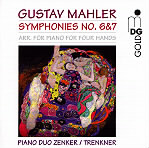Until the invention of the phonograph, the only way you could hear orchestral music at home was to play it at the piano, usually in duet arrangements. This was how several generations of musicians became acquainted with the Mahler symphonies. With more orchestras than ever tackling Mahler on CD, why record Zemlinsky and Casella’s respective duet versions of the Sixth and Seventh Symphonies? The answer is simple. These are among the most compelling duet “de-orchestrations” extant. Mahler’s contrapuntal language emerges with unusual clarity and logic. To be sure, a piano cannot mirror the urgency of the Sixth Symphony’s biting percussion, let alone the eerie woodwind portamentos slithering throughout the the Seventh’s inner movements. Yet both arrangers avoid unduly thick textures, and employ tremolos as expressive devices rather than crutches. The Zenker-Trenker piano duo plays with fire, flexibility, and superb, ker-plop-less ensemble. They particularly shine in the Seventh, navigating its tricky tempo and mood changes with knowing ease. Mahlerites will be glad to see these performances reissued as a two-for-the-price-of-one package. Will the Bruno Walter Mahler Fifth transcription be next?
































